称呼用英语怎么说
英语称呼细讲究

英语称呼细讲究Mr 、Mrs 、Miss 和Ms 是英美人经常使用的称呼,它们分别代表各自不同的含义。
现在,就请打开“英语称呼小档案”,看看它们各自的“履历”吧![一号档案]Mr 是Mister (先生)或Master (主人)的缩写,可以用于一切男子(不论婚否)的姓或姓名的前面,它的复数形式是Messrs.如:Messrs Smith,Green and Jones 史密斯先生,格林先生和琼斯先生Mr 不能与职业、职称、军衔并用,不说“Mr Doctor ”或“Mr Captain ”等,也不可以说“Mr Doctor Wang ”,却可与职衔并用。
如:Mr President 总统先生[二号档案]Mrs 是对已婚妇女的称呼,是Mistress 的缩写,后接丈夫的姓或姓名,其复数形式是Mesdames ,缩写为Mmes .如:Mrs Smith 史密斯夫人Mrs John Smith 约翰。
史密斯夫人Mesdames (Mmes )Rama and Kadul 拉玛夫人和卡杜勒夫人[三号档案]Miss 是对未婚姑娘或女子的称呼,the Misses 是Miss 的复数。
如:Miss Zhang 张小姐the Misses Maton and Raman 马顿小姐和拉曼小姐[四号档案]除了Mr 、Mrs 和Miss 之外,还有另外一个说法,即:Ms (女士)。
这个称呼在美国日益盛行。
无论是已婚的还是未婚的女子都可以用Ms 相称。
所以,当你不敢肯定某女子是“小姐”还是“太太”时,就可以称它为Ms (女士)。
该词的读音是[miz ]。
[特别档案]要注意这四种称呼后面跟的都是某人的姓,而不跟名。
如不说“Mr Jim ”或“Miss Meimei ”,且一般不能单独使用。
如需单独使用,则用sir 或madam 代替。
英语中对人的称呼

英语国家人们相互间的称呼,和我国的习惯相差很大,值得我们研究一下,以免在交往接触中使用不当。
1、男子称呼对于几个或更多的成年男子,可尊称他们为gentlemen,意为“先生们〞。
对于一位不知名的男子,可称为gentleman或sir,但不宜单独用mister这个字称呼他,因为这是小孩子或较卑微的人的口吻。
对于其姓氏的男子,可在他的姓(family name)前冠以Mr.,如Mr.Smith,但不要在他的名前冠以Mr.,如Mr.Jack。
Mr.为Mister 的略语,也读为/'misto/。
用在姓前时,不要全部拼写出来。
比方说Gregory Wood和Milo Weaver两个人.在初认识时可互称Mr.Weaver和Mr.Wood,在比拟熟识后,可互称对方的名(first name),即Gregory(或Greg)和Milo。
千万不要直接称呼叫他的姓,如Wood或Weaver,那是至少半个世纪以前英美富豪对待男仆的称谓。
2、女子称呼按英语国家的习惯,妇女结婚后都使用丈夫的姓。
一个已婚妇女的全名是以自己的first name加上丈夫的family name。
比方说Jane Brown与Greg Wood结婚后,她便称为Jane Wood,而Jane Brown便成为她“未嫁时的名字〞(maiden name),而很少使用。
她在未嫁时被称为Miss Brown,嫁后便被称为Mrs.Wood。
Mrs.读为/'misiz/,由来于mistress,但后者现有别的意思,不再当“夫人,太太〞讲了。
Mrs.从不脱离姓名单独使用;问别人的夫人好,说How is the miss is是故作诙谐、不登大雅的。
对于熟悉的人,Jane Brown不管婚前婚后都只称Jane就可以了。
Jane和Greg在一起可称为the Woods,意为〞伍德两口子〞。
由于妇女结婚后有改随夫姓的问题,故当一个女子说:“I would rather not change my name now.〞她的意思是还不想结婚。
(英语实用)大会发言称呼
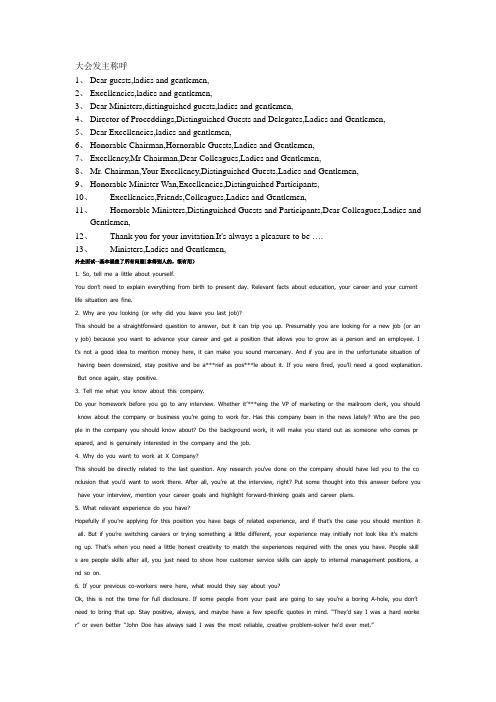
大会发主称呼1、Dear guests,ladies and gentlemen,2、Excellencies,ladies and gentlemen,3、Dear Ministers,distinguished guests,ladies and gentlemen,4、Director of Proceddings,Distinguished Guests and Delegates,Ladies and Gentlemen,5、Dear Excellencies,ladies and gentlemen,6、Honorable Chairman,Hornorable Guests,Ladies and Gentlemen,7、Excellency,Mr Chairman,Dear Colleagues,Ladies and Gentlemen,8、Mr. Chairman,Your Excellency,Distinguished Guests,Ladies and Gentlemen,9、Honorable Minister Wan,Excellencies,Distinguished Participants,10、Excellencies,Friends,Colleagues,Ladies and Gentlemen,11、Hornorable Ministers,Distinguished Guests and Participants,Dear Colleagues,Ladies andGentlemen,12、Thank you for your invitation.It's always a pleasure to be ….13、Ministers,Ladies and Gentlemen,外企面试--基本涵盖了所有问题(拿得别人的,很有用)1. So, tell me a little about yourself.You don’t need to explain everything from birth to present day. Relevant facts about education, your career and your current life situation are fine.2. Why are you looking (or why did you leave you last job)?This should be a straightforward question to answer, but it can trip you up. Presumably you are looking for a new job (or an y job) because you want to advance your career and get a position that allows you to grow as a person and an employee. I t’s not a good idea to mention money here, it can make you sound mercenary. And if you are in the unfortunate situation of having been downsized, stay positive and be a***rief as pos***le about it. If you were fired, you’ll need a good explanation. But once again, stay positive.3. Tell me what you know about this company.Do your homework before you go to any interview. Whether it’***eing the VP of marketing or the mailroom clerk, you should know about the company or business you’re going to work for. Has this company been in the news lately? Who are the peo ple in the company you should know about? Do the background work, it will make you stand out as someone who comes pr epared, and is genuinely interested in the company and the job.4. Why do you want to work at X Company?This should be directly related to th e last question. Any research you’ve done on the company should have led you to the co nclusion that you’d want to work there. After all, you’re at the interview, right? Put some thought into this answer before y ou have your interview, mention your career goals and highlight forward-thinking goals and career plans.5. What relevant experience do you have?Hopefully if you’re applying for this position you have bags of related experience, and if that’s the case you should mention it all. But if you’re switching careers or trying something a little different, your experience may initially not look like it’s matchi ng up. That’s when you need a little honest creativity to match the experiences required with the ones you have. People skill s are people skills after all, you just need to show how customer service skills can apply to internal management positions, a nd so on.6. If your previous co-workers were here, what would they say about you?Ok, this is not the time for full disclosure. If some people from your p ast are going to say you’re a boring A-hole, you don’t need to bring that up. Stay positive, always, and maybe have a few specific quotes in mind. “They’d say I was a hard worke r” or even better “John Doe has always said I was the most reliable, creative p roblem-solver he’d ever met.”7. Have you done anything to further your experience?This could include anything from night classes to hobbies and sports. If it’s related, it’s worth mentioning. Obviously anyth ing to do with further education is great, but maybe you’re spending time on a home improvement project to work on skills such as self-sufficiency, time management and motivation.8. Where else have you applied?This is a good way to hint that you’re in demand, without sounding like you’re whoring you rself all over town. So, be honest and mention a few other companie***ut don’t go into detail. The fact that you’re seriously looking and keeping your options open is what the interviewer is driving at.9. How are you when you’re working under pressure?Once again, there are a few ways to answer thi***ut they should all be positive. You may work well under pressure, you ma y thrive under pressure, and you may actually PREFER working under pressure. If you say you crumble like aged blue cheese, this is not going to help you get your foot in the door.10. What motivates you to do a good job?The answer to this one is not money, even if it is. You should be motivated by life’s noble pursuits. You want recognition fo ra job well done. You want to become better at your job. You want to help others or be a leader in your field.11. What’s your greatest strength?This is your chance to shine. You’re being asked to explain why you are a great employee, so don’t hold back and stay do s tay positive. You could be someone who thrives under pressure, a great motivator, an amazing problem solver or someone wi th extraordinary attention to detail. If your greatest strength, however, is to drink anyone under the table or get a top score on Mario Kart, keep it to yourself. The interviewer is looking for work-related strengths.12. What’s your biggest weakness?If you’re completely honest, you may be kicking yourself in the butt. If you say you don’t have one, you’re obviously lying. T his is a horrible question and one that politi cians have become masters at answering. They say things like “I’m perhaps too c ommitted to my work and don’t spend enough time with my family.” Oh, there’s a fireable offense. I’ve even heard “I think I’m too good at my job, it can often make people jealous.” Please, let’s keep our feet on the ground. If you’re asked this qu estion, give a small, work-related flaw that you’re working hard to improve. Example: “I’ve been told I occasionally focus on details and miss the bigger picture, so I’ve been spending t ime laying out the complete project every day to see my overall p rogress.”13. Let’s talk about salary. What are you looking for?Run for cover! This is one tricky game to play in an interview. Even if you know the salary range for the job, if you answer f irst you’re already showing all your cards. You want as much as pos***le, the employer wants you for as little as you’re will ing to take. Before you apply, take a look at for a good idea of what someone with your specific experience shoul d be pa id. You may want to say, “well, that’s something I’ve thought long and hard about and I think someone with my exp erience should get between X & Y.” Or, you could be sly and say, “right now, I’m more interested in talking more about wha t the position can of fer my career.” That could at least buy you a little time to scope out the situation. But if you do have a specific figure in mind and you are confident that you can get it, I’d say go for it. I have on many occasions, and every ti me I got very close to that figure (both below and sometimes above).14. Are you good at working in a team?Unless you have the I.Q. of a houseplant, you’ll always answer YES to this one. It’s the only answer. How can anyone functi on inside an organization if they are a loner? You may want to mention what part you like to play in a team though; it’s a great chance to explain that you’re a natural leader.15. Tell me a suggestion you have made that was implemented.It’s important here to focus on the word “implemented.” There’s noth ing wrong with having a thousand great ideas, but if the only place they live is on your notepad what’s the point? Better still, you need a good ending. If your previous company took your advice and ended up going bankrupt, that’s not such a great example either. Be prepared with a story about an idea of yours that was taken from idea to implementation, and considered successful.16. Has anything ever irritated you about people you’ve worked with?Of course, you have a list as long as your arm. But you can’t say that, it shows you a***eing negative and difficult to work with. The best way to answer this one is to think for a while and then say something like “I’ve always got on just fine with my co-workers actually.”Use this question as a chance to show tha t you are a team player: “The only people I have trouble with are those who are n’t team players, who just don’t perform, who complain constantly, and who fail to respond to any efforts to motivate them.”The interviewer is expecting a response focused on personality and personal dislikes. Surprise her by delivering an answer th at reflects company values17. Is there anyone you just could not work with?No. Well, unless you’re talking about murderers, racists, rapists, thieves or other dastardly characters, you can work with anyo ne. Otherwise you could be flagged as someone who’s picky and difficult if you say, “I can’t work with anyone who’s a Bronc o’s fan. Sorry.”18. Tell me about any issues you’ve had with a previou***oss.Arrgh! If you fall for this one you shouldn’t be hired anyway. The interviewer is testing you to see if you’ll speak badly about your previous supervisor. Simply answer this question with exteme tact, diplomacy and if necessary, a big fat loss of memor y. In short, you’ve never had any is sues.The answer to 18 is completely wrong. I am a director at a major media company’s interactive division. Our company is expa nding and I am almost in a constant state of hiring. I ask a variation of this question in every single interview and if a candi date has never had one issue or disagreement with anyone, (I stated a variation: I ask if it has happened with anyone in th e workplace) I peg them as a liar and reject them immediately.I went well with my previou***oss. If there is an conflict, I will be open mind and talk about facts. once decision is made, I execute it well.19. Would you rather work for money or job satisfaction?It’s not a very fair question is it? We’d all love to get paid a Trump-like salary doing a job we love but that’s rare indeed. It’s fine to say money is important, but remember that NOTHING is more important to you than the job. Otherwise, you’re just someone looking for a bigger paycheck.20. Would you rather be liked or feared?I have been asked this a lot, in various incarnat ions. The first time I just drew a blank and said, “I don’t know.” That went over badly, but it was right at the start of my career when I had little to no experience. Since then I’ve realized that my g e nuine answer is “Neither, I’d rather be respected.” You don’t want to be feared because fear is no way to motivate a team. You may got the job done but at what cost? Similarly, if you’re everyone’***est friend you’ll find it difficult to make tough de cisions or hit deadlines. But when you’re respected, you don’t have to be a complete bastard or a lame duck to get the job done.21. Are you willing to put the interests of X Company ahead of your own?Again, another nasty question. If you say yes, you’re a corporate whore who doesn’t care about family. If you say no, you’re disloyal to the company. I’m afraid that you’ll probably have to say yes to this one though, because you’re trying to be the perfect employee at this point, and perfect employees don’t cut out early for Jimmy’***a***all game.it is situational. if you… ; if you …. Ethics and professionalism22. So, explain why I should hire you.As I’m sure you know, “because I’m great” or “I really need a job” are not good answers here. This is a time to give the employer a laundry list of your greatest tale nts that just so happen to match the job de script ion. It’s also good to avoid taki ng potshots at other potential candidates here. Focus on yourself and your talents, not other people’s flaws.23. Finally, do you have any questions to ask me?I’ll finish the way I started, with one of the most common questions asked in interviews. This directly relates to the research you’ve done on the company and also gives you a chance to show how eager and prepared you are. You’ll probably want to ask about benefits if they haven’t been covered already. A good generic one is “how soon could I start, if I were offered th e job of course.” You may also ask what you’d be working on. Specifically, in the role you’re applying for and how that affec ts the rest of the company. Always have questions ready, greeting this one with a blank stare is a rotten way to finish your interview. Good luck and happy job hunting.ponder for a moment, and then ask your interviewer “what aspect of your job do you find most challenging”.I would ask the interviewer, “Why do you like to work here?”24. Where do you want to be in 5 to years?They dont want to hear in the same job you are interviewing for. Ultimately, the HR people are searching for someone who can handle the job now, and has the potential to grow into a high level management job in the future. Do you have those g oals too?25. Would you rather work for a big company or a small one?Fav orite answer: I’d treat any company like it was my own regardless. Total ownership of the situation can get you a long w ay.General , the worst answer was “I don’t know.” I’ve since learned that “it depends,” with a couple of examples, is perfectly a ppropriate。
称呼的英语表达
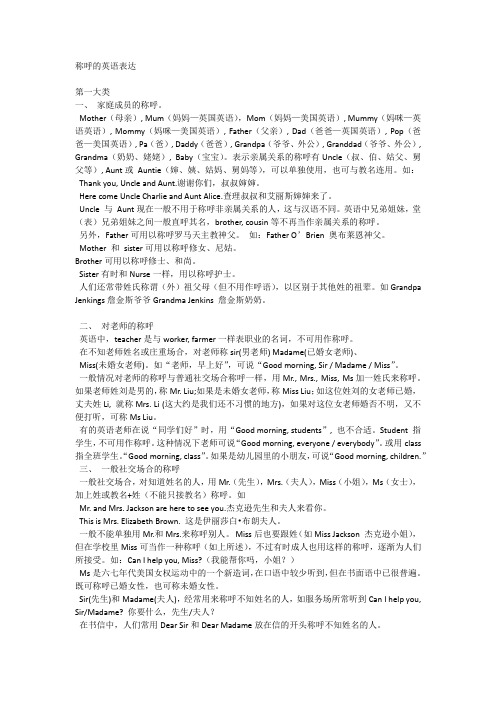
称呼的英语表达第一大类一、家庭成员的称呼。
Mother(母亲), Mum(妈妈—英国英语),Mom(妈妈—美国英语), Mummy(妈咪—英语英语), Mommy(妈咪—美国英语), Father(父亲), Dad(爸爸—英国英语), Pop(爸爸—美国英语), Pa(爸), Daddy(爸爸), Grandpa(爷爷、外公), Granddad(爷爷、外公), Grandma(奶奶、姥姥), Baby(宝宝)。
表示亲属关系的称呼有Uncle(叔、伯、姑父、舅父等), Aunt或Auntie(婶、姨、姑妈、舅妈等),可以单独使用,也可与教名连用。
如:Thank you, Uncle and Aunt.谢谢你们,叔叔婶婶。
Here come Uncle Charlie and Aunt Alice.查理叔叔和艾丽斯婶婶来了。
Uncle 与Aunt现在一般不用于称呼非亲属关系的人,这与汉语不同。
英语中兄弟姐妹,堂(表)兄弟姐妹之间一般直呼其名,brother, cousin等不再当作亲属关系的称呼。
另外,Father可用以称呼罗马天主教神父。
如:Father O’Brien 奥布莱恩神父。
Mother 和sister可用以称呼修女、尼姑。
Brother可用以称呼修士、和尚。
Sister有时和Nurse一样,用以称呼护士。
人们还常带姓氏称谓(外)祖父母(但不用作呼语),以区别于其他姓的祖辈。
如Grandpa Jenkings詹金斯爷爷Grandma Jenkins 詹金斯奶奶。
二、对老师的称呼英语中,teacher是与worker, farmer一样表职业的名词,不可用作称呼。
在不知老师姓名或庄重场合,对老师称sir(男老师) Madame(已婚女老师)、Miss(未婚女老师)。
如“老师,早上好”,可说“Good morning, Sir / Madame / Miss”。
一般情况对老师的称呼与普通社交场合称呼一样,用Mr., Mrs., Miss, Ms加一姓氏来称呼。
英语对喜欢的男孩子的称呼

英语对喜欢的男孩子的称呼
英语中对喜欢的男孩子的称呼有很多种,以下是一些常见的表达方式:
1.crush:短暂而强烈的喜欢或迷恋,通常指对某个人的外貌、才华或性格的欣赏和
着迷。
2.bae:是“before anyone else”的缩写,通常用于称呼自己喜欢的伴侣,表示在任何
人之前,这是我的最爱。
3.honey:一般用于称呼自己心爱的人,常常用来表示甜蜜和温馨的感觉。
4.sweetie:也是用于称呼自己心爱的人,含有可爱、温柔、甜美的意味。
5.darling:通常用于称呼自己深爱的伴侣,表示珍爱和疼爱。
这些表达方式都有不同的含义和用法,选择合适的称呼方式要根据具体情况而定。
英语中各种关系的称呼

英语中各种关系的称呼根据称呼者与被称呼者的关系,称谓语通常可分为亲属称谓和社交称谓。
今天我们来看的就是亲属称谓。
亲属称谓1.亲属称谓主要包括以下两方面(有时大写第一个字母):1)较正式的称谓:mother母亲father父亲son儿子uncle叔叔,伯伯,姨父,舅父aunt姑母,婶母,伯母,姨母grandfather爷爷,外公grandmother奶奶,外婆2)较随便的称谓(昵称):mom(my)妈妈(美)mum(my)妈妈(英)dad(dy)爸爸pa爸爸ma 妈妈auntie/aunty姑妈,舅妈,阿姨granny奶奶,外婆grandma奶奶,外婆grandpa爷爷,外公2.几点注意之处:1)对父母的称呼:不同的家庭可能有不同的称呼,但最通常的是用dad,mum/mon;有的家庭用father,mother,但有人认为这样称呼太正式;至于daddy,mummy/mummy,这通常为小孩用语,不过成年人有时也用;另外非正式用语pa,ma也用得很经常。
2)在亲属称谓中,有些称谓同时也含有社会称谓的功能。
如uncle,aunt,grandpa,grandma等,它们除表示亲属关系外,还可表示一般意义的"叔叔"、"阿姨"、"大爷"、"大妈"等。
3)uncle,aunt(ie),grandpa,grandma等称谓语,除单独使用表示称呼外,它们有时也可与姓名连用:Uncle David大卫叔叔Aunt Polly波莉姑妈AuntieJane珍妮阿姨GrandmaPeterson彼特逊大妈4)son这个词也具有亲属性和社交性两种属性,一方面父母可以直接用son称呼自己的儿子;另一方面,年长的人也可以称年轻的小男孩为son.5)长辈对晚辈的称呼比较随便,通常可以直呼其名(多用昵称),也可用My boy,My girl,My child,Mychildren等称呼语。
最新各种称呼的英语表达
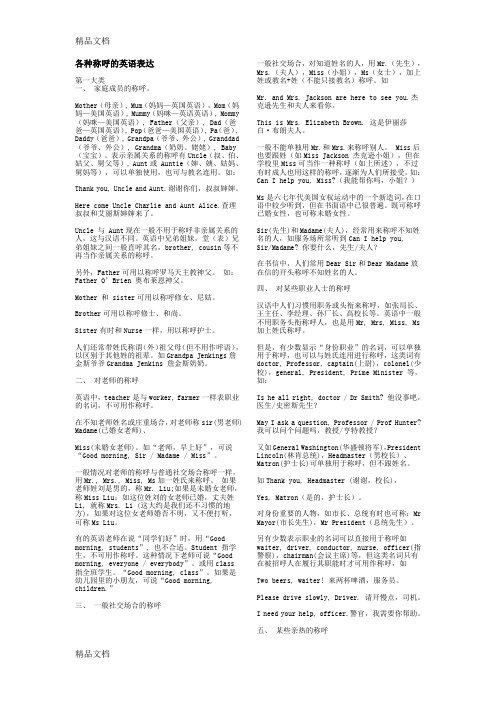
各种称呼的英语表达第一大类一、家庭成员的称呼。
Mother(母亲), Mum(妈妈—英国英语),Mom(妈妈—美国英语), Mummy(妈咪—英语英语), Mommy (妈咪—美国英语), Father(父亲), Dad(爸爸—英国英语), Pop(爸爸—美国英语), Pa(爸), Daddy(爸爸), Grandpa(爷爷、外公), Granddad (爷爷、外公), Grandma(奶奶、姥姥), Baby (宝宝)。
表示亲属关系的称呼有Uncle(叔、伯、姑父、舅父等), Aunt或 Auntie(婶、姨、姑妈、舅妈等),可以单独使用,也可与教名连用。
如:Thank you, Uncle and Aunt.谢谢你们,叔叔婶婶。
Here come Uncle Charlie and Aunt Alice.查理叔叔和艾丽斯婶婶来了。
Uncle 与 Aunt现在一般不用于称呼非亲属关系的人,这与汉语不同。
英语中兄弟姐妹,堂(表)兄弟姐妹之间一般直呼其名,brother, cousin等不再当作亲属关系的称呼。
另外,Father可用以称呼罗马天主教神父。
如:Father O’B rien 奥布莱恩神父。
Mother 和 sister可用以称呼修女、尼姑。
Brother可用以称呼修士、和尚。
Sister有时和Nurse一样,用以称呼护士。
人们还常带姓氏称谓(外)祖父母(但不用作呼语),以区别于其他姓的祖辈。
如Grandpa Jenkings詹金斯爷爷Grandma Jenkins 詹金斯奶奶。
二、对老师的称呼英语中,teacher是与worker, farmer一样表职业的名词,不可用作称呼。
在不知老师姓名或庄重场合,对老师称sir(男老师) Madame(已婚女老师)、Miss(未婚女老师)。
如“老师,早上好”,可说“Good morning, Sir / Madame / Miss”。
一般情况对老师的称呼与普通社交场合称呼一样,用Mr., Mrs., Miss, Ms加一姓氏来称呼。
实用口语:学了这么多年英语 你确定会称呼他人
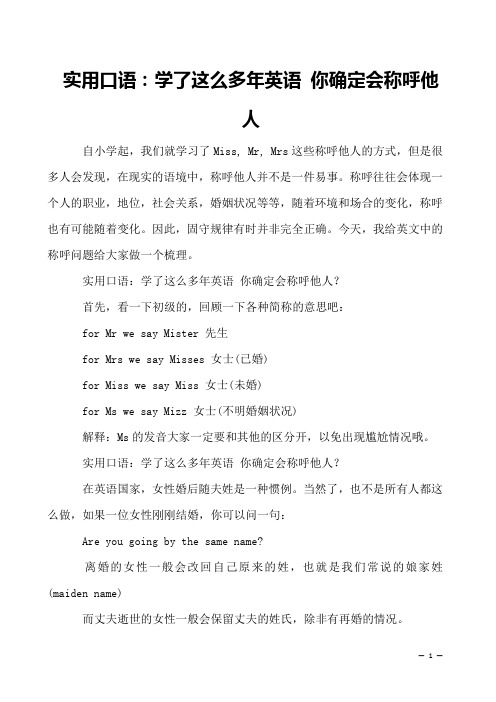
实用口语:学了这么多年英语你确定会称呼他人自小学起,我们就学习了Miss, Mr, Mrs这些称呼他人的方式,但是很多人会发现,在现实的语境中,称呼他人并不是一件易事。
称呼往往会体现一个人的职业,地位,社会关系,婚姻状况等等,随着环境和场合的变化,称呼也有可能随着变化。
因此,固守规律有时并非完全正确。
今天,我给英文中的称呼问题给大家做一个梳理。
实用口语:学了这么多年英语你确定会称呼他人?首先,看一下初级的,回顾一下各种简称的意思吧:for Mr we say Mister 先生for Mrs we say Misses 女士(已婚)for Miss we say Miss 女士(未婚)for Ms we say Mizz 女士(不明婚姻状况)解释:Ms的发音大家一定要和其他的区分开,以免出现尴尬情况哦。
实用口语:学了这么多年英语你确定会称呼他人?在英语国家,女性婚后随夫姓是一种惯例。
当然了,也不是所有人都这么做,如果一位女性刚刚结婚,你可以问一句:Are you going by the same name?离婚的女性一般会改回自己原来的姓,也就是我们常说的娘家姓(maiden name)而丈夫逝世的女性一般会保留丈夫的姓氏,除非有再婚的情况。
如果你对一个人不了解,那么最好用正规的称呼,或者询问对方:What should I call you?What should I call your mum / the teacher / the manager?Can I call you (+ first name) ?Is it okay if I call you (+ the nickname you've heard others use) ?What's your name? (use in a casual situation like a party or classroom where first names are used)解释:怎么称呼您中的"怎么'不要想当然的说成How。
称呼的英语单词

称呼的英语单词
1. title
- 英标:英[ˈtaɪtl];美[ˈtaɪtl]
- 词性:名词(n.)
- 例句:His official title is manager.(他的正式称呼是经理。
)
2. address
- 英标:英[əˈdres];美[ˈædres]
- 词性:名词(n.);动词(v.)(这里取名词表示称呼的含义)
- 例句:What should I use as your address?(我该用什么来称呼你呢?)
3. name
- 英标:英[neɪm];美[neɪm]
- 词性:名词(n.);动词(v.)(这里取名词表示称呼的含义)
- 例句:What's your name? It's a common form of address.(你叫什么名字?这是一种常见的称呼形式。
)
4. appellation
- 英标:英[ˌæpəˈleɪʃn];美[ˌæpəˈleɪʃn]
- 词性:名词(n.)
- 例句:This appellation is rarely used nowadays.(这个称呼如今很少被使用了。
)
5. salutation
- 英标:英[ˌsæljuˈteɪʃn];美[ˌsæljuˈteɪʃn]
- 词性:名词(n.)
- 例句:A formal salutation is required in this business letter.(在这封商务信函中需要一个正式的称呼。
)。
英语未成年女孩的称呼

英语中未成年女孩的常见称呼有:
1、Girl:这是未成年女孩最常见的称呼,可以用于任何年龄段的女孩,包括婴儿和青少年。
2、Young lady:这个称呼通常用于年龄稍大的女孩,表达一种礼貌和尊重的语气。
3、Miss:这个称呼在英语中通常指未婚女性,也可以用于未成年女孩。
4、Missy:这个词有时被用来称呼稍微有些调皮捣蛋的年轻女孩。
5、Tween:这个词是teenage 和between 的合成词,用于描述年龄在10-12 岁之间的女孩。
6、Youngster:这个词用于年龄较小的女孩,尤其是在家庭或朋友圈子中使用。
需要注意的是,称呼未成年女孩时,应该避免使用过于贬低或带有性别歧视的词语,尊重对方的人格和价值。
英语口语正确称呼
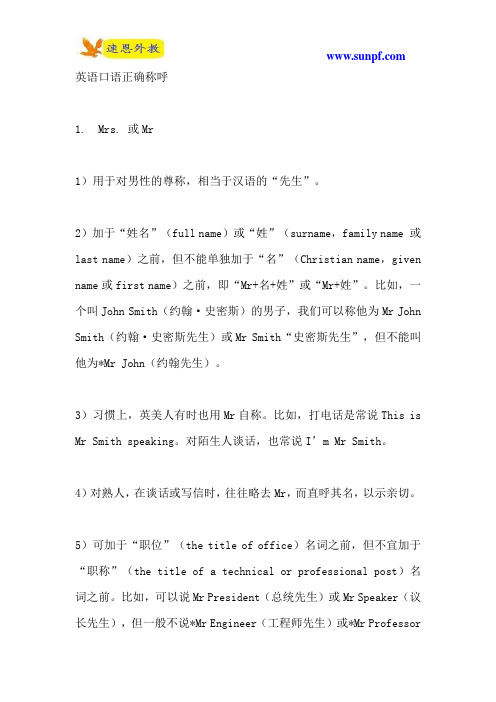
英语口语正确称呼1. Mrs. 或Mr1)用于对男性的尊称,相当于汉语的“先生”。
2)加于“姓名”(full name)或“姓”(surname,family name 或last name)之前,但不能单独加于“名”(Christian name,given name或first name)之前,即“Mr+名+姓”或“Mr+姓”。
比如,一个叫John Smith(约翰·史密斯)的男子,我们可以称他为Mr John Smith(约翰·史密斯先生)或Mr Smith“史密斯先生”,但不能叫他为*Mr John(约翰先生)。
3)习惯上,英美人有时也用Mr自称。
比如,打电话是常说This is Mr Smith speaking。
对陌生人谈话,也常说I’m Mr Smith。
4)对熟人,在谈话或写信时,往往略去Mr,而直呼其名,以示亲切。
5)可加于“职位”(the title of office)名词之前,但不宜加于“职称”(the title of a technical or professional post)名词之前。
比如,可以说Mr President(总统先生)或Mr Speaker(议长先生),但一般不说*Mr Engineer(工程师先生)或*Mr Professor(教授先生)。
2. Mrs. 或Mrs1)用于对已婚女性的尊称,相当于汉语“夫人”或“太太”。
2)加于丈夫的“姓名”或“姓”之前,但不能单独加于“名”之前,即“Mrs+夫名+夫姓”或“Mrs+夫姓”。
比如,一个叫Ellen Butler (艾伦·巴特勒)的女子,嫁给了一个叫James Carter(詹姆斯·卡特)的男子,我们可称她为Mrs James Carter(詹姆斯·卡特夫人)或“Mrs Carter”(卡特夫人),但不能叫她为*Mrs James(詹姆斯太太)。
3)但在法律文件里,则往往用她自己的名配以丈夫的姓,即“Mrs+本名+夫姓”。
父亲的英语的几种称呼

父亲的英语的几种称呼摘要:1.父亲称呼的多样性2.英语中父亲的常见称呼3.各种称呼的语境和适用场合4.如何选择合适的称呼5.总结:父亲的英语称呼的重要性正文:在英语中,父亲的称呼有多种多样。
这些称呼反映了父子关系、文化背景以及个人喜好。
下面我们将详细介绍一些常见的父亲称呼,以及在不同场合如何选择合适的称呼。
1.爸爸(Dad):这是最常见且广泛使用的父亲称呼,适用于各种场合。
爸爸这个词在英语中亲切、温暖,体现了父子之间的亲密关系。
2.爹地(Daddy):这是一个较为亲昵的称呼,常用于家庭成员之间。
爹地一词在口语中使用较多,尤其是孩子对父亲的称呼。
3.父亲(Father):这是一个正式且尊重的称呼,一般在书面语或正式场合使用。
父亲这个词体现了父子之间的尊重和权威。
4.爹(Dad):这是一种简短的称呼,有时也用作父亲的名字,例如“约翰爹”(John Dad)。
这种称呼在口语中较为常见,体现了父子间的轻松氛围。
5.老爸(Old Dad):这是一个幽默、亲昵的称呼,常用于亲密的朋友和家人之间。
这个称呼表达了孩子对父亲的敬爱和感激。
6.伙伴(Partner):在某些家庭中,父亲和孩子之间的关系更像是朋友。
在这种情况下,孩子可能会把父亲称作伙伴。
这个称呼强调了父子之间的平等和友谊。
在实际生活中,选择合适的父亲称呼要根据场合、父子关系以及个人喜好来决定。
在正式场合,如学校家长会、商务聚会等,使用“父亲”或“爹地”较为合适,体现了尊重和亲切感。
而在家庭聚会、日常交流中,可以使用“爸爸”、“爹”等亲昵的称呼,增进父子间的感情。
总之,父亲的英语称呼多种多样,不同的称呼反映了不同的父子关系和场合。
了解这些称呼,并根据实际情况选择合适的称呼,有助于建立和谐的父子关系,增进彼此的了解和感情。
在英语交流中,恰当的称呼也能给人留下良好的印象,体现出尊重和礼貌。
英语女士称呼

英语女士称呼集团档案编码:[YTTR-YTPT28-YTNTL98-UYTYNN08]最早开始学习英语的时候,我们就知道,称呼女人有Miss和Mrs.两种,未婚姑娘称作Miss,现今在美国,一般是十八岁以下的女孩被称为Miss,年龄再大的尽管尚未结婚,也很少被称为Miss了;已婚就称作Mrs.,维基百科中对Miss这个词来源的解释是:Originatinginthe17thcentury,itisacontractionof,whichwasusedforallwomen.Miss是mistress的缩写,mistress可以指称所有女人。
(虽然mistress意为情妇,意思不是很好)不过注意哦,对于结了婚但并未随夫姓的女士,称呼Mrs.也是不妥的;随女权主义运动的兴起,有很多女性不愿意通过称呼体现出自己的婚姻状况(status),所以更倾向于被称为Ms.,这个不论是已婚还是未婚都可以用,所以为礼貌起见,第一次见到女士时,可以用这个称呼。
除了这三个平时很常用的称呼,还有其他的尊称,如madam(或者拼做madame,遵循法语里的拼法,法语字面原意为mylady),来看一下对这个词的阐释:Madamisusedindirectaddress,withoutthewoman'sname,especiallytoaddresswhosenameisnotknown:M ayIhelpyou,madamThemaleequivalentissir.Madam后面不用跟人名,当遇到一位不知其姓名的女士就可以这样称呼她。
相对应的男性尊称为sir。
madam的缩写是ma'ma,大家很可能在电影中听到,对女王的尊称就是ma'ma。
这的确是相当正式的尊称,所以平时日常生活中是不太用到的哦。
最后还有一个尊称,也是大家所熟知的:Lady,在电影和小说中我们都能看到,曾经英国贵族的女士都被尊称为Lady:Thewordladyisapolitetermforawoman,specificallythefemaleequivalentto,orspouseof,alordorgen tleman,andinmanycontextsatermforanyadultwoman.Oncerelatingspecificallytowomenofhighsocial classorstatus,overthelast300yearsithasspreadtoembracealladultwomen.Lady是一个对女性非常客气的称呼,尤其专用于称呼地位尊贵的女性或者贵族夫人。
英语学习家庭成员的称呼

英语学习家庭成员的称呼在英语学习中,家庭成员是我们日常会用到的词汇之一。
正确使用家庭成员的称呼是有效提高英语交流能力的重要一步。
本文将为大家介绍英语中家庭成员的称呼,帮助大家掌握这些常用的词汇。
爸爸 (Father/Dad)在英语中,我们通常用“Father”来称呼爸爸,这是一种正式的表达方式。
而在日常口语交流中,我们更常用的是“Dad”这个亲切的称呼。
当我们感到亲近且熟悉的时候,可以用“Dad”来称呼爸爸。
妈妈 (Mother/Mom)与爸爸一样,我们可以用“Mother”或者更亲切的“Mom”来称呼妈妈。
这两种称呼都可以在正式场合和日常口语中使用。
姐姐 (Elder Sister/Sister)姐姐是我们家庭中的年长的女性成员。
在英语中,我们可以用“Elder Sister”或者简单地用“Sister”来称呼姐姐。
哥哥 (Elder Brother/Brother)哥哥通常是家庭中的年长的男性成员。
英语中,我们可以用“Elder Brother”或者简单的“Brother”来称呼哥哥。
妹妹 (Younger Sister/Sister)妹妹是家庭中的年幼的女性成员。
我们可以用“Younger Sister”或者“Sister”来称呼妹妹。
弟弟 (Younger Brother/Brother)弟弟一般指的是家庭中的年幼的男性成员。
在英语中,我们可以用“Younger Brother”或者“Brother”来称呼弟弟。
爷爷 (Paternal Grandfather/Grandfather)爷爷是我们父亲的父亲。
在英语中,我们通常用“Paternal Grandfather”或者更常用的“Grandfather”来称呼爷爷。
在正式场合,使用“Paternal Grandfather”更为合适。
奶奶 (Paternal Grandmother/Grandmother)奶奶是我们父亲的母亲。
在英语中,我们可以用“Paternal Grandmother”或者“Grandmother”来称呼奶奶。
称呼用英语怎么说

称呼用英语怎么说在人际交往中,选择正确、适当的称呼,反映着自身的教养、对对方尊敬的程度,甚至还体现着双方关系发展所达到的程度和社会风尚,因此对它不能随便乱用。
那么你知道称呼用英语怎么说吗?接下来跟着店铺来学习一下吧。
称呼的英语说法1:call称呼的英语说法2:appellation称呼相关英语表达:家庭称呼 Family Appellatien怎么称呼 How to call收信人称呼 Address of Recipient职位称呼 Job title中国称呼 Names of China称呼的英语例句:1. Sometimes they tell me I'm just a glorified waitress.他们有时候对我说我只是个女招待,只不过称呼好听一些罢了。
2. He calls it a "contraption", using his favourite word of the moment.他用了眼下他最喜欢说的“玩意儿”一词来称呼它。
3. All employees will refer to each other by the honorific suffix "san".所有雇员相互称呼时都须在名字后添加敬语san(日语表示“先生”,“女士”)。
4. We're all on Christian name terms here.我们这里所有的人都用教名相互称呼。
5. Soldiers in various scenes call their enemies " Jap suckers " and " dirty Japs.”大兵从头至尾都称呼对手为对“ 日本鬼子” 和“ 下流的小日本.6. What form of address should one use when writing to your father?写信给你父亲时应该怎样称呼?7. They always addressed each other by their Christian name.他们总是以教名互相称呼.8. This word was used in the old days to address one's superiors.这个词是旧时下对上的称呼.9. How shall we address a prince?我们如何称呼一个王子?10. Tiddler is a British term for youngsters.小鱼儿是英国人称呼年青人的方式.11. Miss Brown that was before she married.布朗小姐,即她婚前的称呼.12. This appellation pleased him.这个称呼很中他的意.13. How should I address her?我该怎么称呼她14. Don't miss her. She is a married woman.不要以小姐称呼她, 她是已婚妇女.15. How shall I address you?我应当怎样称呼您呢?。
用英语称呼女士的方法

用英语称呼女士的方法
在英语中,可以用以下方法来称呼女士:
1. Miss(缩写为Ms.):这是通用的女士称呼,用于不确定对方的婚姻状况或年龄段的情况下。
2. Mrs.:这是已婚女士的称呼,用于已婚女性。
3. Madam:这是一种比较正式的称呼,通常用于正式场合或者对陌生女士的尊称。
4. Ma'am:这是对女性的一种尊称,尤其在美国用得较多。
5. Lady:这是对女士的一种尊称,通常用于正式场合或者对特定地位的女性尊称,比如贵族、皇室成员等。
6. Ms. :这是一种中性称呼,可以用来替代Miss或Mrs.,尤其是当对方的婚姻状况不明确或不重要时。
请注意,在使用这些称呼时,要根据对方的情况和场合来选择合适的称呼。
有些女士可能更喜欢被称呼为她们的名字,所以在不确定的情况下,最好先询问对方或者使用更中性的称呼。
英语发言稿开头用什么称呼好一点

英语发言稿开头的称呼选择在进行英语演讲或发言的时候,一个令人恐惧的部分就是开场白。
开场白是整个演讲的门面,称呼的选择非常重要,可以直接影响到听众的印象和整个演讲的氛围。
那么,英语发言稿开头用什么称呼好一点呢?接下来,我们将探讨几种常见的开场白称呼,以及它们的优缺点。
1. Ladies and Gentlemen“Ladies and Gentlemen” 是一种非常正式和传统的开场白称呼方式,常用于正式的场合,例如演讲、庆典等。
这种称呼显得庄重、尊敬,让听众感受到一种肃穆的氛围。
这种称呼对于正式场合非常适用,但在一些非正式的场合可能显得有些拘谨。
2. Good [morning/afternoon/evening]根据演讲的时间来选择合适的问候词,例如“Good morning” 早上好,“Good afternoon” 下午好,“Good evening” 晚上好。
这种称呼轻松友好,适用于不太正式的场合,如工作会议、学校演讲等。
这种称呼能够拉近主持人与听众之间的距离,营造轻松的氛围。
3. Dear friends/colleagues/guests“Dear friends/colleagues/guests” 这种称呼方式显得亲切、温暖,适用于更加亲近的场合,如研讨会、社交聚会。
这种称呼方式让听众感受到主持人的亲近和尊重,拉近了主持人与听众之间的距离。
4. Hello everyone“Hello everyone” 是一种简单直接的称呼方式,适用于各种场合。
这种称呼方式轻松活泼,让听众感受到一种友好的氛围。
这种称呼简洁明了,适合于各种场合使用。
以上是几种常见的英语发言稿开头称呼方式,每种方式都有其特点和适用场合。
在选择称呼的时候,需要考虑到演讲的性质、听众的群体等因素,选择一种合适的称呼方式能够帮助你更好地与听众建立联系,打动听众,从而提高演讲的效果。
希望以上内容能够帮助到您,在下次英语演讲中选择合适的开场白称呼方式。
- 1、下载文档前请自行甄别文档内容的完整性,平台不提供额外的编辑、内容补充、找答案等附加服务。
- 2、"仅部分预览"的文档,不可在线预览部分如存在完整性等问题,可反馈申请退款(可完整预览的文档不适用该条件!)。
- 3、如文档侵犯您的权益,请联系客服反馈,我们会尽快为您处理(人工客服工作时间:9:00-18:30)。
称呼用英语怎么说
称呼的英语说法1:
call
称呼的英语说法2:
appellation
称呼相关英语表达:
家庭称呼 family appellatien
怎么称呼 how to call
收信人称呼 address of recipient
职位称呼 job title
中国称呼 names of china
称呼的英语例句:
1. sometimes they tell me i'm just a glorified waitress.
他们有时候对我说我只是个女招待,只不过称呼好听一些罢了。
2. he calls it a "contraption", using his favourite word of the moment.
他用了眼下他最喜欢说的“玩意儿”一词来称呼它。
3. all employees will refer to each other by the honorific suffix "san".
所有雇员相互称呼时都须在名字后添加敬语san(日语表示
“先生”,“女士”)。
4. we're all on christian name terms here.
我们这里所有的人都用教名相互称呼。
5. soldiers in various scenes call their enemies " jap suckers " and " dirty japs.
”大兵从头至尾都称呼对手为对“日本鬼子”和“下流的小日本.
6. what form of address should one use when writing to your father?
写信给你父亲时应该怎样称呼?
7. they always addressed each other by their christian name.
他们总是以教名互相称呼.
8. this word was used in the old days to address one's superiors.
这个词是旧时下对上的称呼.
9. how shall we address a prince?
我们如何称呼一个王子?
10. tiddler is a british term for youngsters.
小鱼儿是英国人称呼年青人的方式.
11. miss brown that was before she married.
布朗小姐,即她婚前的称呼.
12. this appellation pleased him.
这个称呼很中他的意.
13. how should i address her?
我该怎么称呼她
14. don't miss her. she is a married woman. 不要以小姐称呼她, 她是已婚妇女.
15. how shall i address you?
我应当怎样称呼您呢?。
